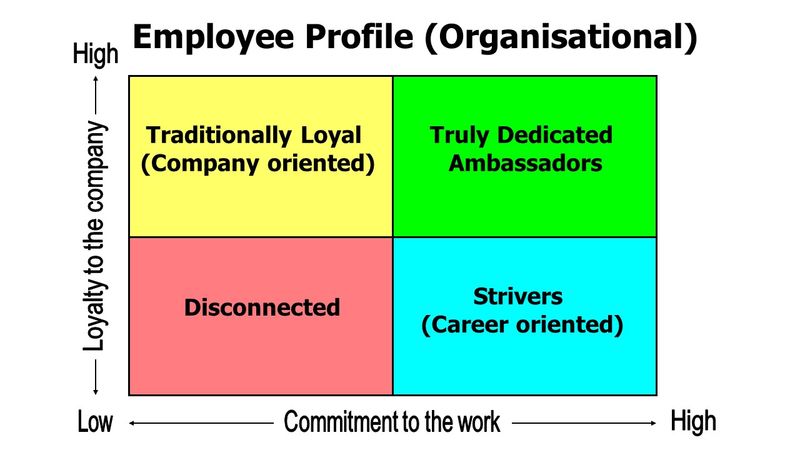What do you make of this chart that I came across this week?
Before you spend too much time on the question, let me confess that it is not entirely a fair one, for this is a summary of that chart. The original was entitled “Employee Career Profile” and included definitions in each quadrants that made it too busy to include here. Thus to answer you need to know what those definitions were. So, going clockwise, they are:
- Traditionally Loyal are company oriented employees who promote the company but are dissatisfied with or don’t care about the work they’re doing. This may impact on their performance. These employees may be happier and more committed in another position.
- Truly Dedicated Ambassadors are employees who speak well of the company and are enthusiastic about their work. These employees are assets, and managers should use them, and their departments as models for others.
- Strivers are career oriented employees who are more focused on their career development. They may be highly productive, but are also at risk of being head hunted. Managers should explore ways to increase company commitment.
- Disconnected are employees who are not enthusiastic about their work or the company they work for. In the extreme, disconnected employees can cause dissent in the workplace. Managers should find and fix issues resulting in low commitment.
The fact that I altered the title may in any case colour your answer. My change implies both that I don’t altogether agree with it and the reason why. Apart from the implication that only ambassadors are assets, for me it epitomises the inherent flaw of nearly all HR and OD initiatives: it starts from the organisational perspective. After all, how can you look at an employee’s career profile without addressing the employee’s personal aims and aspirations?
Realistically assessing an employee essentially entails reviewing two personal attributes, as my chart below shows.
Despite being more personal this still has an organisational bias and both charts are inherently 2 dimensional: neither looks at the career. This is because:
- A career is a journey and not a point in time;
- The employee is currently fulfilling a role which is part of that journey and personal reviews are usually in the context of their performance in that specific role rather than the context of their career;
- The individual and the organisation are two entirely different entities whose aims and aspirations are not necessarily aligned.
There is in fact a third dimension when assessing performance: application. This is where the rubber hits the road and attitude and ability combine. Attitude, Ability and Application are the 3 essential elements of personal assessment and key to the Zealise Triple A performance methodology which is an integral part of the ‘Every Individual Matters Model. ’ They provide the core for individual development and personal growth and so underpin career development.
To be effective, however, you still need to stop viewing things from a totally organisational viewpoint. This requires a mechanism for aligning the individual, their personal and career development and the organisation. And that is the other facet of the ‘Every Individual Matters Model.’ It provides the catalyst for common purpose and a longer term framework that aligns individual development with organisational strategy to create a win-win for both parties.
There is an increasing tendency to do away with annual performance reviews. That is as it should be, for performance assessment should be an ongoing activity. It is also one that is most honestly done by the employee when the pressures of measurement and its consequences are removed. Career development, however, is not something the person can address unilaterally: it calls for a conversation. Managers still need to sit down with employees and ascertain to what extent they are growing and developing as people, how their work is contributing to that, and what needs to be done to provide and sustain that self-development.
This conversation is no longer a performance review but rather a personal review. The focus is on the individual rather than on their performance, with the organisation providing the context. This makes it more all-embracing and compels both parties to recognise and address the work-life integrity of the individual, both immediately and in the longer term. This cements a collaborative effort – a partnership – that inevitably benefits both parties.
_____________________________________________________________________________
Contact me today for a free 30 minute conversation about how my ‘Every Individual Matters’ Model can help you create an organisational culture that embraces change and transforms – and sustains – organisational performance.
_____________________________________________________________________________
Bay is the founder and director of Zealise, and the creator of the ‘Every Individual Matters’ organisational culture model that helps transform organisational performance and bottom-line results. Bay is also the author of several books, including “Lean Organisations Need FAT People” and “The 7 Deadly Toxins of Employee Engagement” and, more recently, The Democracy Delusion: How to Restore True Democracy and Stop Being Duped.

